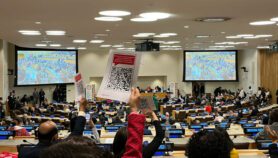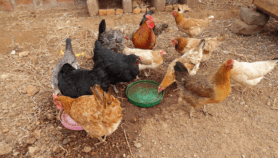By: Bennen Buma Gana
Send to a friend
The details you provide on this page will not be used to send unsolicited email, and will not be sold to a 3rd party. See privacy policy.
[YAOUNDE] Malaria could encourage mother-to-child transmission of HIV by making pregnant women produce a chemical that boosts HIV replication, say scientists in Cameroon.
This might explain why more children are born with HIV after the rainy season there, when malaria cases also increase, says lead researcher Afumbom Kfutwah of the Pasteur Centre in Yaoundé.
Pregnant women with malaria produce increased quantities of a chemical called TNF-alpha in their placentas, the organ that nourishes the foetus as it develops.
In laboratory tests, the researchers showed that the chemical stimulated HIV replication in placental tissue. Kfutwah says this means TNF-alpha might increase the chance of HIV passing from pregnant women to their unborn children.
The ongoing study’s initial findings were presented yesterday (17 November) at the Fourth Multilateral Initiative on Malaria conference in Yaoundé.
Kfutwah pointed out that studies elsewhere in Africa had found links between malaria and HIV transmission.
In 2003, a Ugandan study of nearly 750 pregnant women with HIV showed that the virus was transmitted to babies in 40 per cent of cases when the mother also had malaria, compared to just 15 per cent of cases when she did not (see Malaria boosts mother-child HIV transmission).
“We need more resources to increase knowledge and better understand the interaction between HIV and malaria,” says Albert Kilian, former malaria advisor to Uganda’s health minister. “Evidence to date suggests that this is a complex interaction.”
“People living with HIV are a specific vulnerable group for malaria and need access to prevention tools such as insecticide-treated nets,” adds Kilian.
Modest Mulenga of the Tropical Diseases Research Centre in Ndola, Zambia, says the findings suggest that if it were possible to reduce the number of malaria parasites in the placenta, this might limit HIV transmission from mother to child.













